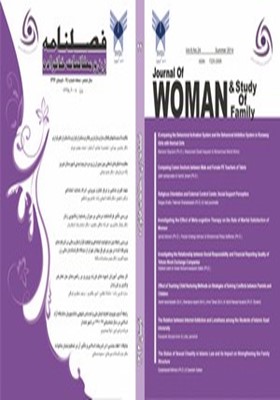بررسی رابطه بین مسئولیت اجتماعی و کیفیت گزارشگری مالی در شرکتهای پذیرفته شده در بورس اوراق بهادار تهران از دیدگاه کارشناسان مالی زن
محورهای موضوعی : زن و خانواده
کلید واژه: کیفیت گزارشگری مالی, پایداری سود, مسؤولیت اجتماعی, قابلیت پیش بینی سود,
چکیده مقاله :
هدف این پژوهش بررسی رابطه بین مسؤولیت اجتماعی و کیفیت گزارشگری مالی در شرکتهای پذیرفته شده در بورس اوراق بهادار تهران می باشد. در این پژوهش برای اندازه گیری مسؤولیت اجتماعی از پرسشنامه های استاندارد در این زمینه و به منظور محاسبه کیفیت گزارشگری مالی از سه معیار، کیفیت اقلام تعهدی، پایداری سود و قابلیت پیش بینی سود استفاده شده است. در این پژوهش،تعداد 78 شرکت پذیرفته شده در بورس اوراق بهادار تهران بررسی شده است که شامل دوره زمانی 1386-1390 است. در تحقیق حاضر از سه متغیر، اندازه شرکت، نسبت ارزش بازار به دفتری و اهرم مالی به عنوان متغیرهای کنترل استفاده شده است. ابزار گردآوری داده های کیفیت گزارشگری مالی، صورتهای مالی شرکت ها بوده و ابزار گردآوری داده های مسؤولیت اجتماعی پرسشنامه محقق می باشد که پس از پایایی سنجی آن میان اعضای نمونه تقسیم و پس از گردآوری داده ها با استفاده از نرم افزار آماری SPSS تجزیه و تحیل صورت پذیرفته و فرضیات مورد آزمون قرار گرفتند. نتایج پژوهش نشان می دهد که مسؤولیت اجتماعی با کیفیت اقلام تعهدی و پایداری سود رابطه معناداری ندارد. اما مسؤولیت اجتماعی با قابلیت پیش بینی سود رابطه معنادار دارد.
This study investigated the relationship between social responsibility and financial reporting quality of Tehran Stock Exchange companies. In this study, we used the standard questionnaires to measure social responsibility and the three criteria in order to calculate the quality of financial reporting, accruals quality, earnings stability and predictability of earnings. In this study, 78 companies which are listed at Tehran Stock Exchange were evaluated in the period of 2007-2011.The three control variables are firm size, ratio of market value to book value and financial leverage. The data related to financial reporting quality and corporate social responsibility were gathered from companies’ financial statements and a researcher –made questionnaire. After assessing the reliability of the questionnaire, we divided it among the members of the sample; then by using SPSS software, we analyzed the data and tested the hypotheses. The results show that there is no relationship between social responsibility and accruals quality and earnings stability. But social responsibility has a positive influence on earnings predictability.
- تقی زاده هوشنگ، سلطانی فسقندیس غلامرضا (1389)، تاثیر اخلاق کسب و کار بر مسئولیت اجتماعی بنگاه، فصلنامه اخلاق در علوم و فناوری، سال پنجم، شماره های 3و4، ص 104-94.
- جبارزاده کنگرلوئی، بایزیدی انور(1389)، بررسی رابطه مسئولیت اجتماعی و تعهد سازمانی با محافظه کاری در گزارشگری مالی شرکتهای پذیرفته شده بورس اوراق بهادار تهران، فصلنامه بورس اوراق بهادار، سال سوم، شماره9، بهار89،ص 96-77
- رویایی رمضانعلی، حسین مهردوست(1388)، بررسی نقش مدیران فرهنگی در ارتقای مسئولیت اجتماعی، پژوهش نامه علوم اجتماعی،سال سوم،شماره 3، 59-43.
- عرب صالحی و دیگران (1392)، رابطه مسئولیت اجتماعی با عملکرد مالی در شرکتهای پذیرفته شده در بورس اوراق بهادار تهران،پژوهشهای تجربی حسابداری، سال سوم، شماره9، 1392، ص1-20
- مشبکی اصغر، خلیلی شجاعیوهاب(1389)، بررسی رابطه فرهنگ سازمانی و مسئولیت اجتماعی سازمانها (وزارت نیرو به عنوان مورد)، جامعه شناسی کاربردی، سال بیست و یکم، شماره پیاپی(40)، شماره چهارم، ص37-56.
- Choi, T.H. and Pae J. (2011), Business Ethics and Financial Reporting Quality: Evidence fromKorea. Journal of Business Ethics, Vol. 103, 403-427.
- Davis, K. (1960), "Can business afford to ignore its social responsibility?” California Management Review, 2 (3), 70-76
- Jin, G. K. & Drozdenko, R. G. (2010). "Relationships among Perceived Organizational Core Values, Corporate Social Responsibility, Ethics, and Organizational Performance Outcomes: An Empirical Study of InformationTechnology professionals", Journal of Business Ethics, Vol. 92, 341–359
- Karna, et al, (2004), Social responsibility in environmental marketing planning. European Journal of Marketing, Vol. 37 No. 5/6
- Kim, M. and kim, Y. (2014), Corporate social responsibility and shareholder value of restaurant firms, International Journal of Hospitality Management, Vol. 40, 120-129.
- Kim, Y. & Kim, S. Y. (2010),"The Influence of Cultural Values on Perceptions of Corporate Social Responsibility: Application of Hofstede’s Dimensions to Korean Public Relations Practitioners", Journal of BusinessEthics, Vol. 91, 485–500.
- Kim, Y., Li, H. and Li, S. (2014),Corporate social responsibility and stock price crash risk, Journal of Banking & Finance, Vol. 43, 1-13.
- Kim, Y., Park, M. and Wier, B. (2012), Is Earnings Quality associated with Corporate Social Responsibility? The Accounting Review, Vol. 87, No. 3, 761-796.
- Laksmana, I. and Yang Y. (2009), Corporate citizenship and earnings attributes. Advances in Accounting, incorporating Advances in International Accounting, Vol. 25, 40-48.
- Lantos, G. P. (2001), The boundaries of strategic corporate social responsibility. Journal of Consumer Marketing, 18(7), 595-630.
- Liang H. &Renneboog L. (2014), The Foundations of Corporate Social Responsibility, Finance Working Paper N 394.
- MELO, T.; MOURA-LEITE, R.C.; PADGETT, R.C. Conceito de responsabilidade social corporativa dos hotéis de luxo de Natal/RN, Brasil. Caderno Virtual de Turismo. Rio de Janeiro, v. 12, n. 2, p.152-166, ago. 2012.
- Porter, M.E. (1991), American’s green strategy. Scientific American, 264, 168
- Rahahleh, M. Y., Shariari, J. A.(2008), The Extent of Social Responsibility Accounting Application in the Qualified Industrial Zones in Jordan. Journal of International Management Review, Vol. 4 No. 2, pp 5
- Saiful, Jan (2006), Defining Corporate Social Responsibility. Journal of Public Affairs 6: 176-184.
- Salewski, M. and Zülch H. (2012), The Association between Corporate Social Responsibility (CSR) and Earnings Quality – Evidence from European Blue Chips, HHL Working Paper Series No. 112.
- Verdi, R.S.(2006), "FinancialReporting Quality and Investment Efficiency" Working paper,University of Pennsylvania.
- Werhane, P.H. (1985), "Persons, rights and corporations", Englewood Cliffs, Prentice-Hall.
- Zairi, M., and Peters, J. (2002), "The impact of social responsibility on business performance", Managerial Auditing Journal, 17 (4), 422-456.
- Zhu, D & Tan, K.H (2008), Issues and challenges of CSR practices in textile industry: an empirical study in Suzhou, China. Management and Enterprise Development Journal, 5(6): 759-772.

